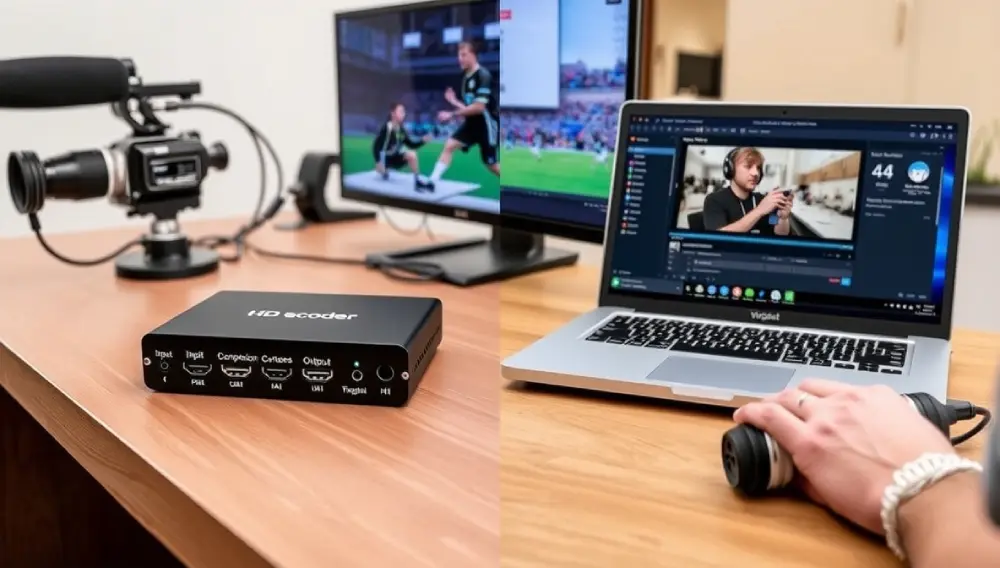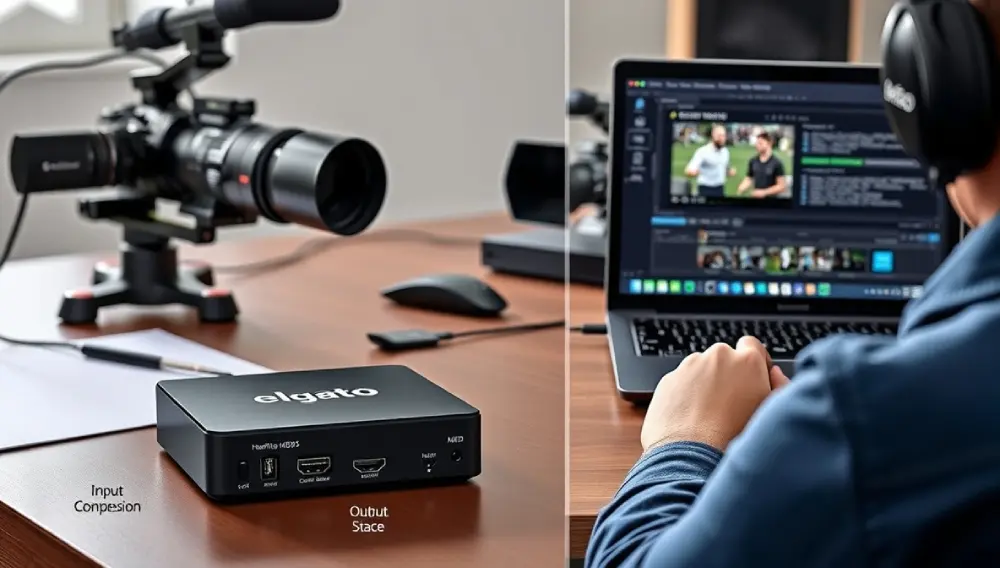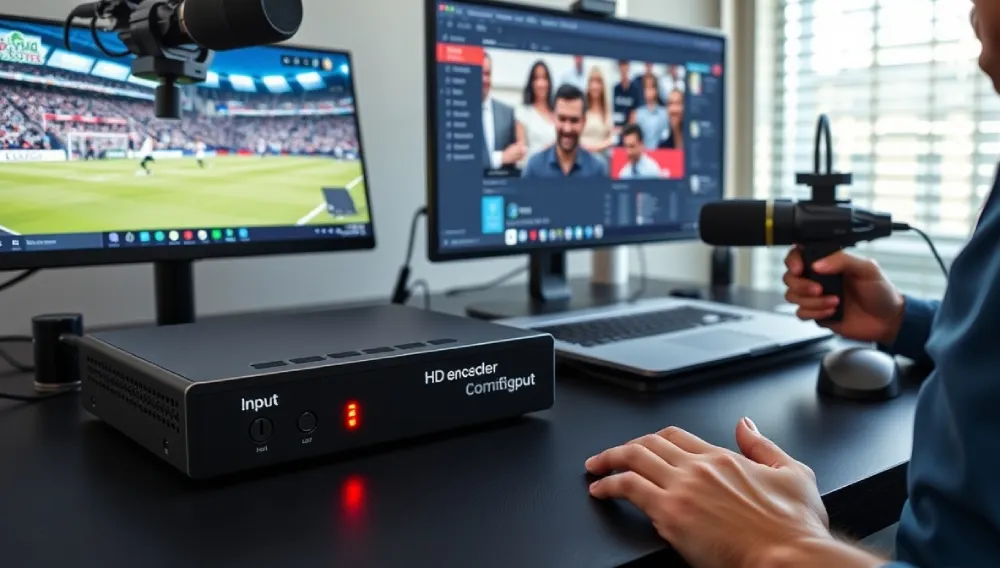HD encoders are essential tools for anyone looking to stream or record high-definition video. Whether you’re a content creator, gamer, or professional broadcaster, an HD encoder ensures your video quality is crisp, clear, and professional. In this guide, we’ll explore what an HD encoder is, how it works, and why it’s a must-have for your setup. We’ll also provide product recommendations, a buying guide, and FAQs to help you make the best choice.

What is an HD Encoder?
An HD encoder is a device or software that converts raw video and audio into a compressed digital format suitable for streaming or recording. It supports high-definition resolutions (720p, 1080p, or higher) and ensures your content looks great while minimizing file size and bandwidth usage.
How Does an HD Encoder Work?
- Input: The encoder captures raw video and audio from a camera, screen, or other source.
- Compression: It compresses the data using codecs like H.264 or H.265 to reduce file size.
- Output: The compressed video is streamed live or saved for later use.
Why Do You Need an HD Encoder?
HD encoders are crucial for:
- High-Quality Streaming: Deliver sharp, clear video to your audience.
- Professional Broadcasting: Ensure reliable, low-latency streams for live events.
- Content Creation: Record gameplay, tutorials, or presentations in HD.
- Bandwidth Optimization: Stream efficiently without sacrificing quality.

Types of HD Encoders
There are two main types of HD encoders:
1. Hardware Encoders
These are standalone devices designed for high-performance encoding.
- Pros:
- Dedicated processing power for smooth encoding.
- Low latency for real-time streaming.
- Reliable and durable.
- Cons:
- Expensive compared to software encoders.
- Less flexible for customization.
2. Software Encoders
These are programs that run on your computer and use its resources for encoding.
- Pros:
- Affordable or free (e.g., OBS Studio).
- Highly customizable with plugins and settings.
- Easy to set up and use.
- Cons:
- It can strain your computer’s CPU and GPU.
- May not support real-time encoding on lower-end systems.
Applications of HD Encoders
HD encoders are used in a variety of scenarios:
- Gaming: Stream gameplay on platforms like Twitch or YouTube Gaming.
- Webinars: Host live seminars or workshops.
- Corporate Events: Broadcast conferences or product launches.
- Education: Stream classes or tutorials to a wider audience.
- Sports: Live-stream local games or events.
Product Recommendations
Here are some of the best HD encoders on the market:
1. Elgato HD60 S+ (Hardware Encoder)
- Pros:
- Records and streams in 1080p at 60 FPS.
- Plug-and-play functionality.
- Compact and portable.
- Cons:
- Expensive for casual users.
- Limited to H.264 encoding.

2. OBS Studio (Software Encoder)
- Pros:
- Free and open-source.
- Highly customizable with plugins and themes.
- Supports multiple platforms simultaneously.
- Cons:
- Steeper learning curve for beginners.
- Requires a powerful PC for high-quality streams.
3. Teradek Vidiu X (Hardware Encoder)
- Pros:
- Supports 1080p streaming.
- Compact and portable.
- Built-in bonding for reliable internet connections.
- Cons:
- Pricey for small-scale streamers.
- Limited to RTMP streaming.
4. vMix (Software Encoder)
- Pros:
- Professional-grade features like multi-camera support.
- Easy to use with a user-friendly interface.
- Affordable pricing for small businesses.
- Cons:
- Requires a Windows PC.
- Can be resource-intensive.
Buying Guide: How to Choose the Right HD Encoder
Choosing the right HD encoder depends on your needs, budget, and technical expertise. Here’s a step-by-step guide to help you decide:
1. Determine Your Streaming Goals
- Casual Streaming: Software encoders like OBS Studio are perfect for beginners.
- Professional Streaming: Invest in a hardware encoder for reliability and performance.
2. Check Compatibility
- Platforms: Ensure the encoder supports your streaming platform (e.g., Twitch, YouTube).
- Devices: Verify compatibility with your camera, microphone, and computer.
3. Consider Video Quality
- Resolution: Choose an encoder that supports your desired resolution (e.g., 720p, 1080p).
- Frame Rate: Higher frame rates (e.g., 60 FPS) provide smoother video.
4. Evaluate Your Budget
- Software Encoders: Free or low-cost options are great for beginners.
- Hardware Encoders: Ideal for professionals but come at a higher price.
5. Look for Additional Features
- Multi-Camera Support: Essential for professional setups.
- Low Latency: Important for real-time interactions with viewers.
- Portability: Useful for on-the-go streaming.
Personal Experience with HD Encoders
As a content creator who streams both gaming and tutorials, I’ve experimented with various HD encoders. For casual streams, OBS Studio has been my go-to choice due to its flexibility and zero cost. However, for high-quality broadcasts, I rely on the Elgato HD60 S+. Its 1080p at 60 FPS capabilities and plug-and-play functionality have been game-changers for my workflow. The only downside is the price, but it’s worth the investment for professional-grade results.

FAQs About HD Encoders
1. Do I need an HD encoder to go live?
Yes, an encoder is essential for converting and compressing your video for live streaming.
2. Can I use my smartphone as an HD encoder?
Yes, apps like Streamlabs and Larix Broadcaster can turn your smartphone into an HD encoder.
3. What’s the difference between H.264 and H.265?
H.265 offers better compression and quality than H.264 but requires more processing power.
4. How much internet speed do I need for HD streaming?
- 720p at 30 FPS: 3-5 Mbps upload speed.
- 1080p at 60 FPS: 6-8 Mbps upload speed.
5. Can I stream to multiple platforms at once?
Yes, some encoders like OBS Studio and vMix support multi-platform streaming.
Conclusion
HD encoders are essential tools for anyone looking to share high-definition video content. Whether you’re a beginner or a professional, choosing the right encoder can elevate your streaming experience. For casual streamers, OBS Studio is a fantastic starting point, while professionals may prefer hardware encoders like the Elgato HD60 S+ or Teradek Vidiu X.
By following this guide, you’ll be well-equipped to select, set up, and optimize your HD encoder for seamless broadcasts. Happy streaming!
Read More: encoder hevc


2 thoughts on “The Best HD Encoder Your Guide to High-Definition Video Streaming and Recording”